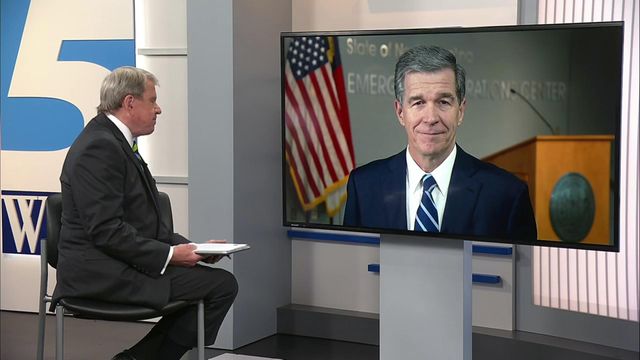Cooper: More virus-related restrictions coming for NC
Gov. Roy Cooper said Thursday that his administration will soon implement more restrictions to squelch the spread of the new coronavirus in North Carolina, but a statewide "stay-at-home" order remains too broad for now.
Posted — Updated"When we put a statewide order in place, it's in place for everyone – rural and urban," Cooper said in an interview from the state Emergency Operations Center.
Thirty-nine of North Carolina's 100 counties haven't reported any coronavirus cases so far.
Several other counties and cities across the state also have restricted where people can go in public and what businesses can remain open during the pandemic.
"The counties do have authority to make decisions for themselves, and I understand local leaders wanting to go ahead and move," Cooper said.
He declined to say what added restrictions the state is planning or when they would take effect, saying his administration is still gathering input from public health and safety experts.
"We want people to stay at home, and a number of the actions that we have already taken have encouraged that," he said.
Hospitals and physicians statewide have asked Cooper for a statewide stay-at-home order, while the North Carolina Chamber has said it should be a "last resort" because of the impact it would cause on the state economy.
"We're fighting a two-front war. The No. 1 front is health care, saving lives, public safety. But also, the second war that we have to fight is people who are struggling right now, small businesses that are struggling because of this pandemic. We need to help them as well," Cooper said, pointing to the needle he is trying to thread.
"We know that this is a serious situation, and we are looking at other guidelines and restrictions that we will be bringing forward at the appropriate time," he said. "It's important to ratchet this up right now because we have got to make sure that our medical system is not overwhelmed, and we see the tragedy that occurs when that happens."
Cooper pointed to New York, where more than 5,300 people have already been hospitalized and Gov. Andrew Cuomo is projecting that will climb to 140,000 over the next two to three weeks.
"We don't want people to die because we didn't have enough beds, because we didn't have enough ventilators," Cooper said.
"We need everybody to do their part, to stay home when they possibly can, to continue social distancing to stop the spread of this virus, and we need to support our front-line medical providers who are getting ready for this surge [of patients] that we know is coming," he added.
People with mild symptoms, especially those considered at lower risk fro contracting COVID-19, the illness associated with the virus, are now encouraged to stay at home and consult with their personal physician until the symptoms resolve themselves, which is in line with guidelines from the Centers for Disease Control and Prevention.
Cooper said the shift in testing strategy also was done "out of necessity," noting county health departments and hospitals face critical shortages of personal protective equipment for health care providers administering the tests and a state lab lacks supplies to run many tests.
"I want us to test as many people as possible because, No. 1, you can know to isolate them and try to prevent the spread of the virus, and No. 2, you get more of a picture of what kind of problem that you have," he said. "But because the federal government was unprepared and because those testing supplies are not available, along with the personal protection equipment, there's been a shift in the focus, where you have to, right now, make choices of putting things where you need it most."
"We're working on it around the clock, and we're going to keep working on it until we get through this," he said. "We want to do it losing as few lives as possible and making sure that our state stays as economically stable as possible."
He urged North Carolina residents to pull together during the crisis.
"We all need to come together to slow the spread of this virus. It's going to be critical to our health, safety and welfare," he said.
• Credits
Copyright 2024 by Capitol Broadcasting Company. All rights reserved. This material may not be published, broadcast, rewritten or redistributed.






